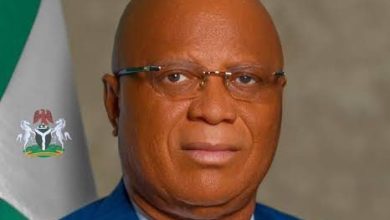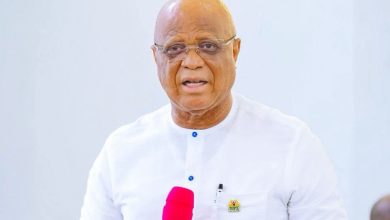
State Governors in service to the State are paid salaries among other entitlements. Whether they deliver on their mandate or not, there is hardly any debate on if they deserve a pay or not especially as the Scriptures at 1 Timothy 5:18 says that ” The labourer deserves his Wages.”
However, in many States of the Federation, when Governors and their Deputies exit office, they continue to draw emoluments from the State treasury through the nomenclature of pension for former governors.
In fact, in Nigeria, 22 States have passed life pension laws for former governors and other ex-public officials.
The States include : Akwa Ibom; Edo; Delta; Kano; Gombe; Yobe; Borno; Bauchi; Abia; Imo; Bayelsa; Oyo; Osun; Kwara; Ondo; Ebonyi; Rivers; Niger; Kogi; and Katsina States, Lagos and Zamfara State.
Some of these States are suffering from high level of poverty, unemployment, insecurity, infrastructure deficit and lack of payment of backlog of pensions and gratuities of workers.
But just how much do former governors and their deputies take out of the treasury?
The amount differ from States to States. Yet, the style and drive remains the same.
In Oil rich Akwa Ibom State for instance, complimentary to N200 million annual pension to ex-governors and their deputies, the Akwa Ibom Governors and Deputy Governors Pension Law 2014 makes it mandatory for ex-governors and deputies to enjoy pension for life at a rate equivalent to the salary of the incumbent governor/ deputy governor respectively.
In addition to this, 5 bedroom mansion in Abuja and Akwa Ibom State must be provided, a new official car and a sport-utility vehicle every four years; one personal aide and provision of adequate security; a cook, chauffeurs and security guards for the ex-governor at a sum not exceeding N5 million per month and N2.5 million for the ex-deputy governor, are the other gains they are expected to luxuriate in.
The law also provides for a furniture allowance of 300 per cent of annual basic salary every four years in addition to severance gratuity and a medical allowance not exceeding N12 million per annum for the spouse of an ex-Governor provided that such a spouse was married to the Governor at the time he or she was in office. N2.2million goes to ex-governors as entertainment allowance while N2.1million goes to ex-deputies. Also, the State is mandated to bear the burial expenses of an ex-governor and pay condolence equivalent to the amount of basic salary of the incumbent governor.
In Akwa Ibom State, this Law was engineered for enactment in the year 2000 by Governor Victor Attah. However, Governor Godswill Akpabio repealed and blossom it in year 2014. After public outcry, the Akwa Ibom State House of Assembly said the sections of the law that generated the outcry were repealed. Yet, this law is shrouded in secrecy from the public. Interestingly, pension law for former Governors has not thrived without blitzkriegs. So far, what have been the result of the onslaughts?
Battle Against Ex- Governors Pension Law
In 2017, Socio-Economic Rights and Accountability Project ( SERAP) began a campaign for the pension law for former Governors to be invalidated. It approached the Federal High Court in Lagos State for the determination of the matter.
Consequently, after months of legal combat, in December 2019, the Court ordered the Federal Government to recover pensions collected by former governors serving as ministers and members of the National Assembly.
The court went further to direct the Attorney General of the Federation and Minister of Justice, Mr. Abubakar Malami, SAN to challenge the legality of States’ pension laws permitting former governors and other ex-public officials to collect such pensions.
According to the Punch Newspaper of December 4, 2019, Immediate past governor of Akwa Ibom State, Godswill Akpabio, is among other governors affected by the ruling.
Interestingly, on January 2, 2020, the National Industrial Court declared as null and void, payment of pension and gratuity to former governors and deputy governors.
The court gave the judgment while ruling in a suit brought against the Taraba State government by Alhaji Garba Umar who was once the Acting Governor of Taraba State. He had dragged the State government to the court, claiming that he was entitled to gratuity as a former governor of the State. Why then is the pension law null and void in the eyes of the law, you may wonder.
Why Pension Law for Ex- Governors is illegal
In its ruling, the National Industrial Court held that it appeared that there was a “contradiction by the provision of section 124(5) ‘of the 1999 Constitution’ which enabled the House of Assembly of a State to provide for pension or gratuity to governors and deputy governors which items are also placed under the exclusive legislative list under Part 1, of the Second Schedule to the 1999 Constitution.”
The Court went further to hold that the State Houses of Assembly in Nigeria lacked the power to fix any amount in remuneration to its past governors and deputy governors as “pension or gratuity unless the Revenue Mobilisation Allocation and Fiscal Commission first of all determined an amount as pension and gratuity to past governors and deputy governors in which case such amount so fixed, shall not exceed the amount as have been determined by the Revenue Mobilisation Allocation and Fiscal Commission.”
It said since the commission had not fixed any amount as pension and gratuity to past governors and deputy governors in Nigeria that any law made by any State House of Assembly granting pension and gratuity to its past governors and deputy governors was therefore null and void. Yet, one may ask: why is the law passed by State lawmakers who have been empowered by the constitution to make laws declared null and void?
A legal practitioner, who is the Managing Solicitor, Whyte Horse Solicitors, Lagos and also an International Law Partner in the Law Firm of Ceejay Solicitors Stratford, London, Barr Victor Ukutt offers himself to explain why several courts have nullified the said law made by the States House of Assembly.
He notes that the House of Assembly does not have the power to enact a law regarding pension since pension falls under Item 44 of the exclusive legislative list.
The International Law Partner added ” Pension falls under Item 44 of the exclusive legislative list. It is not under the concurrent list nor residual list. No House of Assembly can pass a law under the 1999 constitution as amended relating to substantive pension of a governor or former as the case may be. It is only the National Assembly that has the legislative competence to legislate on pension matters. And the National Assembly has passed Pension Act of 2004 which has been repealed and enacted as pension Reform Act of 2014.”
The Legal practitioner notes that Section 291 of the 1999 Constitution sub 3, 4 name the category of persons that should be paid pension as ” persons in the public service of the Federation or a State.”
He adds ” Also, under the Pension Reform Act of 2014, Section 1,2,3 and 5 of the enactment spell out the categories of persons that pension should be paid to pursuance to the powers conferred on the National Assembly and Ex-governors or other political office holders are not included.”
Ukutt points out that a Governor of the State is not within the contemplation of the constitution a public officer therefore cannot be entitled to Pension.
He mentions that a case in point is when the Supreme Court ruled on the matter in a Case between Dim Ojukwu vs Umaru Musa Yar’Adua.
According to (2009) Law Pavilion Electronic Law Report, LEPLR- SC.270/2007, Justice Niki Tobi ruled that Governors and Deputy Governors are not civil or public servants within the provision of Section 137(1)(g) of the Constitution.
The report states ” I agree that the latin maxim “expressio unius est exclusion alterius applies to exclude Governors and Deputy Governors. In like manner while persons employed in the civil or public service of the Federation and of a State includes Clerk or other staff of the National Assembly, and State Assemblies, they do not include elected members of the National and State Assemblies.”
Ukutt says that this ruling was also upheld in the case of the Governor of Abia State, Governor Theodore Orji and Chief Onyema Ugochukwu. He notes that the court held that since elected office holders do not have a letter of employment or their retirement date stated in their employment letter, they cannot receive pension.
Stemming from the Court rulings, Ukutt mentions that according to section 173 of the 1999 constitution as amended, only those in public service are to receive pension. He notes that the constitution recognizes public officers to be limited to those who work in the public service of the State to the public service of the federation stressing that the constitution spells out the Clark of the House, staff of the House of Assembly, and those who work in the civil service and local Government.
Nonetheless, since Governors among other elected officers are not regarded as public officers hence due for pension, does this mean that after their service, they will not have a reward for take home?
Reward for Ex-Governors
The Legal practitioner says that at the end of a Governor’s tenure just as it is for all political office holders, they are entitled to severance gratuity which runs into several millions.
He adds ” Every month, the Governor has access to Security votes of over N2 billion naira which he is not accountable to anybody. What do they do with such amount of money?
With the illegality of the said law exposed, what then is the way forward?
The Way forward
In November 2019, the Zamfara State House of Assembly nullified their pension law for former Governors and Deputy Governors.
Barr Ukutt says that the Akwa Ibom State House of Assembly having realized through several court rulings and the provisions of the constitution that the Pension law passed by them for Governors and Deputy Governors is unconstitutional should take the path of honour to repeal it just as Zamfara State House of Assembly has done thus stop ex-governors from taking the funds of the State.
He states that the House of Assembly which should have used its enormous powers provided to them by the constitution to check the executive has rather allowed themselves to be used as willing tools in the hands of the executive.
Ukutt notes ” The Akwa Ibom State House of Assembly were irresponsible and unreasonable to have pass that law because the Governor excluded them. If it is right for political office holders to receive pension, then they should have included themselves among other politicians as beneficiaries.
While doubting that the 7th Assembly has the gusto and interest of the public to repeal the law, he states ” Sadly, the Akwa Ibom State House of Assembly which should have checked this abuse are in the pocket of the Governor. You can imagine how they approved the allocation to education at just N4 billion but approved N36 billion for Government House.
“Are you building a new Government House? Instead of asking the governor, why are you allocating this jumbo amount of money to Government House but allocate peanut to education, they kept quiet and endorsed it. So it is left to be seen how they will repeal this law.”
The legal practitioner advise that in case the Akwa Ibom State House of Assembly fails to repeal the ” unconstitutional law”, it would be the place of Individual citizens in State who are tax payers to challenge in court the Akwa Ibom State Government and Akwa Ibom State House of Assembly as parties in the suit.
Will the Akwa Ibom State House of Assembly wait for the challenge in Court or will they repeal this law?
AKHA Speaks on the Ex- Governors Pension law
Contacted, the Akwa Ibom State House of Assembly admits that since Several Courts have ruled that the Pension Law for Ex-Governors is illegal and that the House of Assembly do not have the competence to legislate on such law, they consequently accept it to be illegal.
According to the Chairman, Akwa Ibom State House of Assembly Committee on Information and Member Etinan State Constituency, Rt. Hon Aniefiok Denis, the Akwa Ibom State House of Assembly will reconsider the law towards repealing it.
He says ” We just finished from Christmas Break and we are going to look into it. Most times, it comes as an Executive Bill. That notwithstanding, when repealing it, it can become a private member Bill.
” We have not considered it yet. But we will look into it. We don’t know whether one member is working on it. As it stands now, it is not before the House. We will take appropriate steps at the appropriate time.”
With the promise, Akwa Ibom people now count chickens over when the 7th Assembly of the State will put words to action.




